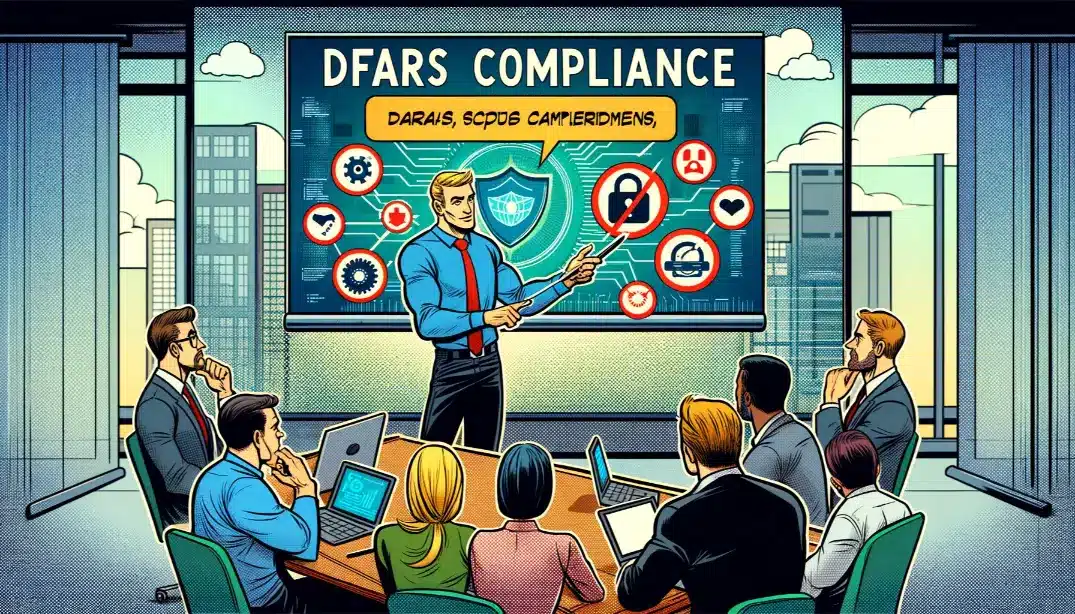
Tim Mektrakarn
February 26, 2025
DFARS vs CMMC: Understanding Compliance in the Defense Sector
The landscape of cybersecurity in the defense industry is complex and continuously evolving. Two critical standards governing this realm are the Defense Federal Acquisition Regulation Supplement (DFARS) and the Cybersecurity Maturity Model Certification (CMMC). Both play pivotal roles in safeguarding sensitive information in the DoD supply chain, but differ in approach and application. This article compares and contrasts DFARS vs CMMC, explores their objectives, and provides insights into how businesses can achieve compliance.

DFARS vs CMMC: A Comparative View
DFARS is a set of regulations that primarily aims to protect Controlled Unclassified Information (CUI) within the defense industry. It requires defense contractors to comply with specific cybersecurity standards outlined in NIST SP 800-171. The focus is on the implementation of adequate security measures to safeguard CUI from cyber threats.
On the other hand, CMMC serves as a unifying standard for implementing cybersecurity across the defense industrial base. It introduces a tiered certification model, ranging from basic cyber hygiene to advanced security practices. CMMC’s objective is not just to protect CUI. It is to enhance the overall security posture of defense contractors.
How DFARS and CMMC Complement Each Other
DFARS and CMMC, though distinct, work in tandem to strengthen the defense sector’s cybersecurity framework. DFARS sets the baseline for protecting CUI. CMMC builds upon this foundation, introducing a more comprehensive and tiered approach to cybersecurity. CMMC’s tiered model acknowledges that not all contractors need the same level of security. This allows for a more tailored and scalable approach to cybersecurity.
Key Differences
The primary difference lies in their scope and implementation:
- Scope of Protection: DFARS is specific to protecting CUI. CMMC encompasses a broader range of security protocols applicable to various information types.
- Certification Process: Compliance with DFARS is self-attested, meaning contractors self-certify their adherence to NIST standards. In contrast, CMMC requires an external audit by a CMMC accreditation body, making the certification process more stringent.
- Levels of Compliance: CMMC 2.0 introduces three levels of maturity, each with increasing security requirements for DoD contractors. DFARS compliance is more binary – either you meet the NIST standards, or you don’t.
Understanding DFARS
The Defense Federal Acquisition Regulation Supplement (DFARS) is a set of rules and guidelines that serve as an extension to the Federal Acquisition Regulation (FAR). DFARS is specifically tailored for the United States Department of Defense (DoD). Established to address the unique needs of the DoD, DFARS provides a framework for acquiring goods and services in a manner that ensures national security and defense interests are protected. Its inception and continuous evolution reflect the growing complexities and heightened risks in national defense procurement processes.

DFARS Requirements for Contractors
Compliance with DFARS is mandatory for all contractors doing business with the DoD. One of the central requirements is adhering to the cybersecurity standards set out in the National Institute of Standards and Technology (NIST) Special Publication 800-171. These standards detail security controls for sensitive data stored in non-federal systems and networks. Contractors are required to implement these security controls, report cybersecurity incidents, and undergo regular assessments to verify compliance.
Protecting Controlled Unclassified Information
The role of DFARS in protecting CUI is critical. By enforcing stringent cybersecurity measures, DFARS helps prevent unauthorized access to or disclosure of sensitive information that could jeopardize national security. It ensures that contractors who handle CUI maintain robust security protocols. These include access control, incident response, employee training, and regular monitoring of information systems.
Compliance Challenges
However, compliance with DFARS can be challenging, particularly for smaller contractors with limited resources. The complexities of NIST SP 800-171, combined with the need for continuous monitoring and updates to security practices, can be daunting. The cost of implementing the required cybersecurity measures and the ongoing need for staff training and awareness further add to these challenges. Moreover, the evolving nature of cyber threats means that compliance is not a one-time effort but a continuous process of adaptation and improvement.

Special DFAR Clauses
The clauses DFARS 252.204-7012 (introduced in October 2016) , DFARS 252.204-7019, and DFARS 252.204-7020 (introduced in September 2020 and November 2020 respectively), are specific regulations within the Defense Federal Acquisition Regulation Supplement (DFARS) framework. Each addresses different aspects of cybersecurity and information protection for DoD contractors. Here’s an explanation of each:
DFARS 252.204-7012: Safeguarding Covered Defense Information and Cyber Incident Reporting
This clause is one of the most critical cybersecurity requirements for defense contractors. It mandates the protection of Covered Defense Information (CDI) and the reporting of cyber incidents. Key elements include:
- Safeguarding CDI: Contractors are required to provide adequate security to safeguard CDI on their unclassified information systems. This is generally achieved by implementing the security requirements specified in NIST SP 800-171.
- Cyber Incident Reporting: In the event of a cyber incident, contractors must rapidly report the incident to the DoD Cyber Crime Center (DC3), conduct a review for evidence of compromise of CDI, and preserve relevant media for DoD to review.
- Malicious Software: If a contractor discovers malicious software during a cyber incident investigation, they are required to submit the malware to the DC3.
- Flow Down Requirement: This clause must be flowed down to all subcontractors who are handling CDI.
DFARS 252.204-7019: Notice of NIST SP 800-171 DoD Assessment Requirements
Implemented as a part of the effort to enhance the cybersecurity posture of the Defense Industrial Base, this clause focuses on assessments of a contractor’s implementation of NIST SP 800-171. Key aspects include:
- NIST SP 800-171 Assessment: Contractors are required to complete a self-assessment of their NIST SP 800-171 implementation, scoring themselves against the DoD Assessment Methodology.
- Submission to the Supplier Performance Risk System (SPRS): Contractors must submit their self-assessment score to the SPRS, a system used by the DoD to evaluate a contractor’s past performance and risk.
- Periodic Assessments: Contractors must conduct and submit these self-assessments periodically to ensure ongoing compliance.

DFARS 252.204-7020: NIST SP 800-171 DoD Assessment Requirements
This clause complements 252.204-7019 by adding further requirements related to the NIST SP 800-171 assessments. Key elements include:
- DoD Assessments: In addition to self-assessments, the DoD may conduct or request medium or high assessments of a contractor’s implementation of NIST SP 800-171.
- Access to Facilities and Systems: Contractors are required to provide access to their facilities, systems, and personnel when it is necessary for DoD to conduct or renew an assessment.
- Corrective Action Plans: If deficiencies are identified in an assessment, contractors must develop and document corrective action plans to resolve the issues.
These DFARS clauses collectively aim to ensure defense contractors maintain a strong cybersecurity posture. DFARS 252.204-7012 focuses on safeguarding CDI and incident reporting. 252.204-7019 requires contractors to conduct self-assessments and report their compliance with NIST SP 800-171. 252.204-7020 details the DoD’s rights to assess and verify a contractor’s cybersecurity measures, along with the contractor’s responsibilities in case of deficiencies.
Conclusion: CMMC vs DFARS
Understanding and complying with DFARS and CMMC is crucial for businesses operating in the defense sector. While DFARS provides the groundwork for protecting CUI, CMMC introduces a more structured and leveled approach to cybersecurity. The key to successful compliance lies in recognizing the nuances of each standard and adopting a comprehensive strategy that addresses both. As cybersecurity threats evolve, staying ahead in compliance protects sensitive information and positions companies favorably in the competitive defense industry landscape.
Bright Defense Delivers Continuous Compliance!
Bright Defense protects our clients from cybersecurity threats through continuous compliance. Our team of CISSP and CISA-certified security experts will develop and execute a cybersecurity program to meet common frameworks, including CMMC. We also offer our clients CMMC assessments and other CMMC compliance services for both CMMC Level 1 and Level 2. Other focus frameworks include NIST 800-171, SOC 2, ISO 27001, and HIPAA.
Bright Defense is also partnered with PreVeil which builds a special enclave hosted in AWS GovCloud that meets 102 out of the 110 NIST 800-171 controls. PreVeil can be implemented for small to large enterprises protecting email and document sharing with end-to-end encryption and advanced key management.
Get started with Bright Defense today to learn more about our DFARS and CMMC compliance solutions!
FAQ Section: Understanding CMMC vs DFARS
What is the Cybersecurity Maturity Model Certification (CMMC)?
The Cybersecurity Maturity Model Certification (CMMC) is a certification process established by the Department of Defense (DoD). It ensures that defense contractors have adequate cybersecurity measures in place. The certification assesses a company’s implementation of cybersecurity practices and processes, ranging from basic cyber hygiene to advanced.
How Do DFARS Regulations Relate to Data Security?
The Defense Federal Acquisition Regulation Supplement (DFARS) regulations are a set of requirements that defense contractors must meet to protect sensitive defense information. These regulations mandate implementing specific cybersecurity measures to safeguard Controlled Unclassified Information (CUI) within the contractor’s network.
What are the Key Security Controls Required for CMMC Compliance?
CMMC compliance involves implementing a range of security controls, which vary depending on the certification level. These controls include access control, incident response, risk management, cybersecurity training, and information protection. The focus is on protecting federal contract information and CUI from cyber threats.
How Does CMMC Impact the DoD Supply Chain?
CMMC impacts the DoD supply chain by requiring all contractors and subcontractors to obtain a certain level of CMMC certification. This ensures that every link in the supply chain is secure and can protect sensitive defense information against cyber threats, enhancing the overall security of the DoD’s operations.
What are the Differences Between CMMC and DFARS Regulations?
While both CMMC and DFARS regulations aim to protect sensitive government information, they differ in approach and scope. DFARS is more focused on compliance with specific cybersecurity standards, whereas CMMC introduces a tiered certification process that assesses a company’s maturity in implementing cybersecurity practices.
How Can Organizations Prepare for CMMC and DFARS Compliance?
Organizations can prepare for CMMC and DFARS compliance by conducting thorough cybersecurity assessments, updating security policies and procedures, training employees, and implementing necessary technological changes. Seeking guidance from cybersecurity experts and staying updated with DoD requirements are also crucial steps.
What is the Role of the Federal Government in CMMC Implementation?
The federal government, specifically the Department of Defense, plays a central role in CMMC implementation. It sets the standards, oversees the certification process, and ensures that contractors comply with the required cybersecurity practices to secure the defense supply chain.
How Do CMMC and DFARS Help Prevent Cyber Attacks?
CMMC and DFARS help prevent cyber attacks by establishing robust cybersecurity requirements for defense contractors. They ensure that sensitive defense information is protected through standardized security practices, thereby reducing vulnerabilities and enhancing the defense industry’s resilience against cyber threats.
Get In Touch



